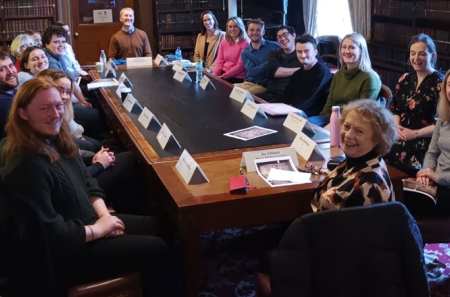
Jan Łukasiewicz, Professor of Mathematical Logic at the Royal Irish Academy
07 November 2022The latest library guest blog post by Dr Eoin Kinsella, Managing Editor, Dictionary of Irish Biography reflects on the Royal Irish Academy (RIA) exhibition about the life and career of Professor Jan Łukasiewicz (1878–1956).
On 11 October 2022 the Royal Irish Academy hosted the launch of an exhibition marking the life and career of Professor Jan Łukasiewicz (1878–1956), a Polish logician and philosopher whose work has been instrumental in the developments of both academic fields. Some of his most important work was completed in Ireland after the second world war, while he held a Professorship of mathematical logic at the RIA.
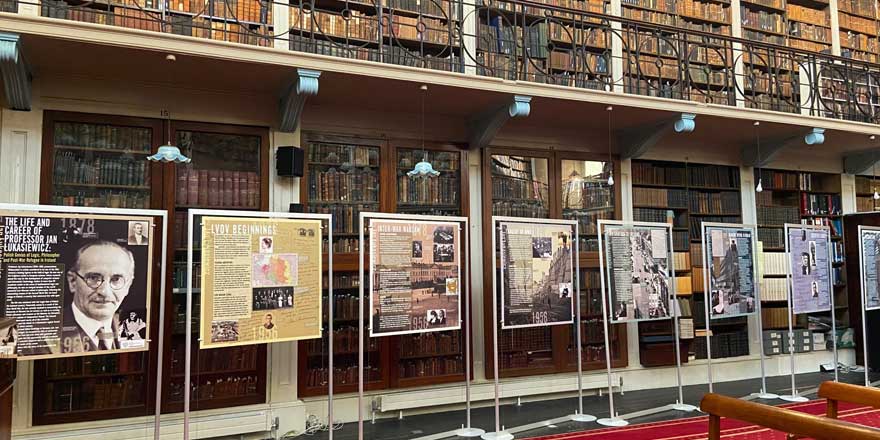
Fig.1 Royal Irish Academy meeting room with Professor Jan Łukasiewicz exhibition on display
I was fortunate enough to play a small role in bringing this exhibition to fruition. I must confess that I was unaware of Łukasiewicz’s work before I was contacted by the Embassy of the Republic of Poland in Dublin - fortunately Łukasiewicz’s life and work in his native Poland was well covered by my colleague, Professor Jan Jadacki. Drawing on collections in the Library of the RIA and the National Archives of Ireland, I was able to uncover some of the more obscure details of Łukasiewicz’s time in Ireland.
The brilliance of Łukasiewicz’s mind ensured that his name would be recorded for posterity; that his academic achievements came in a life that experienced the devastation of two world wars, and exile from his home in Warsaw in his late sixties, was nothing short of remarkable. But even in a remarkable life, the story of how Łukasiewicz and his wife Regina ended up in Dublin is wonderfully bizarre. Having fled Poland towards the end of the war, the Łukasiewiczs found themselves in Brussels in February 1946, with few prospects before them. There Łukasiewicz met a Polish-speaking Irishman in the uniform of a Polish officer. There can’t have been too many of those floating around Belgium at the time, but we have no idea who this man was. He urged Łukasiewicz to travel to Dublin, where he said the Irish government would welcome displaced distinguished scholars.
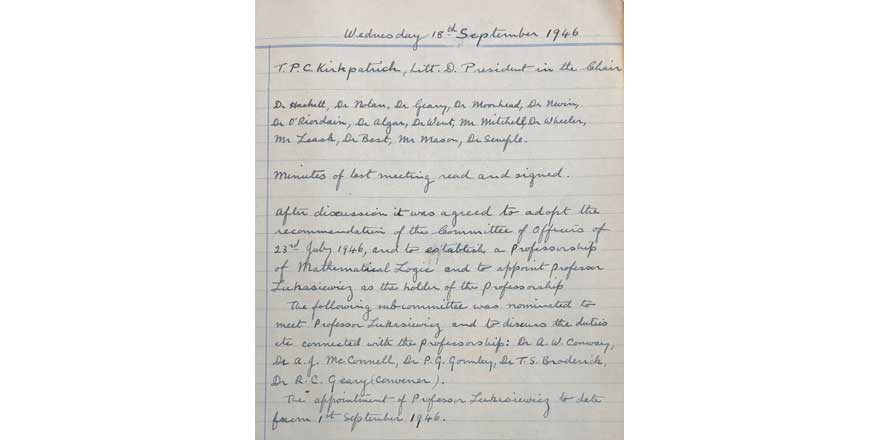
Fig.2 Royal Irish Academy council minutes from 18 September 1946 recording the appointment of Łukasiewicz to the Professorship of Mathematical Logic
That proved to be the case, and that summer the Łukasiewiczs had an audience with Taoiseach Éamon de Valera. Łukasiewicz recorded the meeting in his diary: ‘He told me that he would take care of my fate and he kept his word.’
It’s particularly appropriate for the exhibition to make its debut in the Meeting Room of the Royal Irish Academy, because de Valera kept his word by arranging for the RIA to appoint Łukasiewicz as a Professor of mathematical logic, funded by the Irish government.

Fig.3 Irish dedication to Éamon de Valera in Logika I metafizyka (RIA C/21/3-6) translated as ‘In honour of Éamon de Valera, a great statesman and scholar.
It is with thanks to him that Jan Łukasiewicz was able to spend the last years of his creative life in Dublin, welcomed after being expelled from his homeland.’
On 18 November 1946 Łukasiewicz delivered his first public lecture in Ireland in that very room. The Irish Press carried a detailed report the following day. Łukasiewicz, it observed, was a
Professor without a chair, a man without a home. This country has given him shelter and a position in keeping with his eminent reputation. This is more than a gesture of sympathy towards a distinguished foreigner. To have a man of Dr Łukasiewicz’s standing amongst us to aid the cause of advanced study is a national gain.
His appointment as a Professor in the Royal Irish Academy was highly unusual, though not without precedent - again at the behest of Eamon de Valera, the Academy had appointed Erwin Schrödinger as a Professor of theoretical physics in 1940, if only for six months while the Dublin Institute of Advanced Studies was being set up. As far as I can ascertain, apart from Schrödinger and Łukasiewicz only two other people have ever been appointed as Professors of the Academy: Gerhard Besu and Ernst Lewy.
During the decade in which he lived and worked in Dublin, Łukasiewicz was able to reconstruct and publish work he had abandoned in Warsaw, and to conduct new research in the field of symbolic logic. It was a period later described by one of his former students as ‘one of the most fruitful of his scientific career’ and led to the completion of his magnum opus, a monograph titled Aristotle’s Syllogistic from the Standpoint of Modern Formal Logic.

Fig.4 Title page and spine of monograph titled Aristotle’s Syllogistic from the Standpoint of Modern Formal Logic (RIA MR/26/H/32)
The challenge of an exhibition like this (one that’s true of all life writing apart from full-length, biographical treatment), is that it’s very difficult to distil a person’s life into a handful of information panels - especially one filled with so many incidents and achievements. One of the real advantages of the format, however, is that the visuals can offer counterpoints to the text and pose questions that the physical restrictions of a word count don’t allow. As an example, there’s a wonderful photo of Łukasiewicz and his wife Regina on one of the panels, taken shortly after their arrival in Dublin. They’re both smiling, and we can only imagine their relief at having landed in what would prove a safe haven after the traumatic experience of fleeing their homeland.
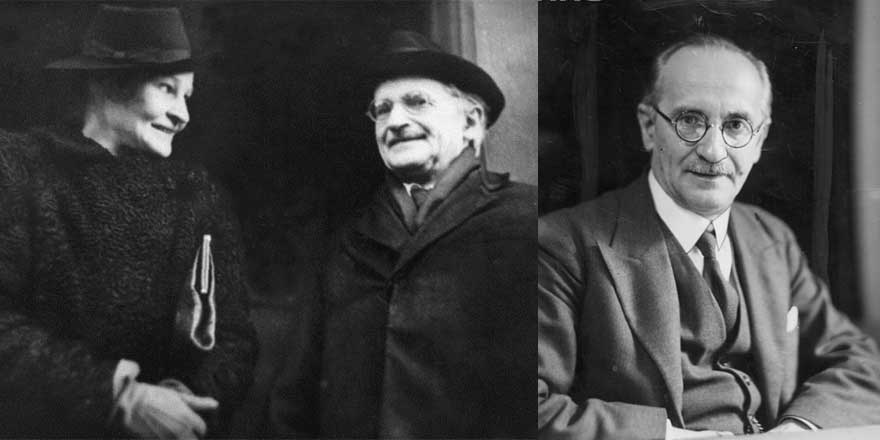
Fig.5 (left) Jan and Regina Łukasiewicz shortly after their arrival to Dublin in 1946 (Image: Irish Press, 19 November 1946; courtesy the Irish Newspaper Archive)
Fig.6 (right) Jan Łukasiewicz as the laureate of the Science Award of the City of Warsaw, 11 November 1935 (Image: Public domain)
When we juxtapose that photo with those of Łukasiewicz in his former life as a distinguished academic in Warsaw, the exhibition asks us to ponder just how deeply the couple were affected by the loss of that life in Poland, with its friendships and the academic connections Łukasiewicz formed in the Lvov-Warsaw School of Philosophy.
Though the distance of time has somewhat dimmed the public’s memory of his time in Ireland, it’s worth noting that Łukasiewicz’s achievements were certainly recognised here during his lifetime, and indeed after his death. After his appointment as Professor of mathematical logic, he was invited to deliver lectures at Queen’s University, Belfast, in 1950 and 1952.
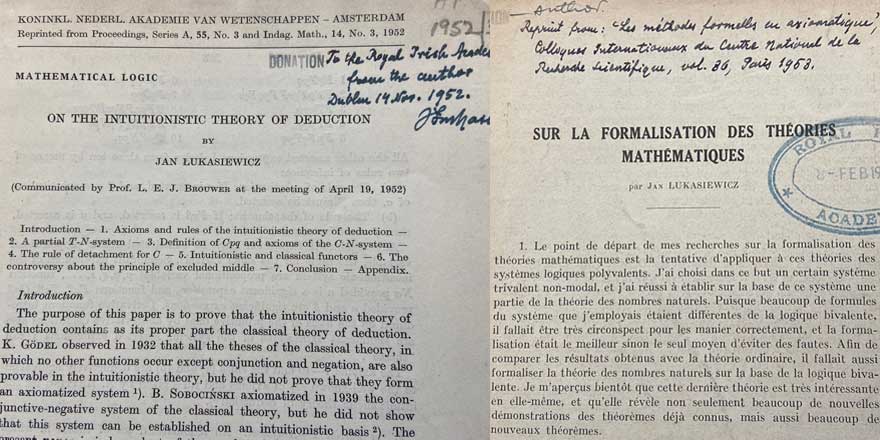
Fig.7 (left) Donation signed by Łukasiewicz of his paper On the intuitionistic of deduction (RIA AP 1952/39)
Fig.8 (right) Donation from Łukasiewicz of his paper Sur la formalisation des théories mathématiques (RIA AP 1953/27)
Even before his book on Aristotle’s syllogistic had been published, the gifted English mathematician, logician and computer scientist Alan Turing arranged for Łukasiewicz to visit the Victoria University of Manchester. In recognition of his academic achievements, on 5 July 1955 Łukasiewicz received an honorary doctorate from Trinity College Dublin. An honorary degree is the highest honour that a university can bestow upon an academic, though University College Dublin found a suitable posthumous alternative, at least for a time. Its Department of Computer Science was housed in what was called Łukasiewicz Building for about a decade in the late 1990s and early 2000s; an apt honour for an academic whose work was so fundamental to the development of computer science.

Fig.9 Letter from Łukasiewicz to Boole Committee dated 20 May 1954
expressing his regrets at not being able to attend centenary celebrations (RIA MS 12 K 45)
It’s always a thrill to reconstruct a person’s life, especially one so influential in such varied fields of academic study, and whose work paved the way for intellectual and technological innovations that are fundamental to the way that we live today. An appreciation published in the Proceedings of the Royal Irish Academy after his death neatly encapsulated his career: ‘His [work] … marks a turning point in the history of logic … His analyses of essential logical problems are distinguished by great clarity and extraordinary beauty of style.’

Fig.10-11 Obituary notice from Royal Irish Academy proceedings minutes of 1955-56 session (RIA 43.D)
Dr Eoin Kinsella
Keep an eye out for publication next year of an entry on Jan Łukasiewicz in the Dictionary of Irish Biography. The exhibition produced by the Polish Embassy of Ireland and hosted by the Royal Irish Academy continues until the end of the year.

Fig.12 Cover of Jan Łukasiewicz exhibition booklet


